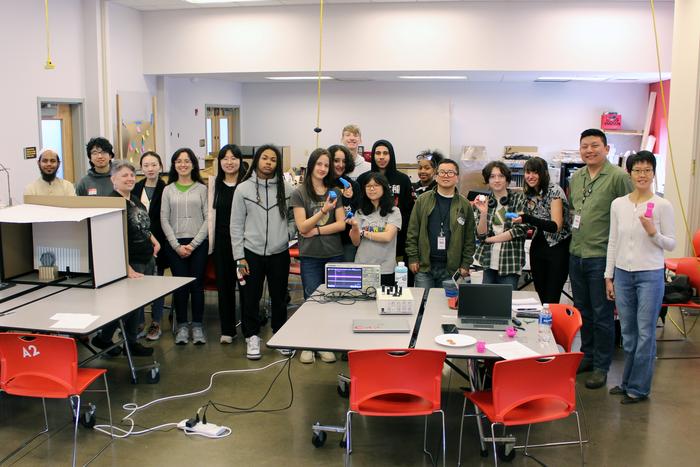On top again: UTA wins national award for noise control engineering
For the fourth time in five years, students at The University of Texas at Arlington have won a prestigious national award for noise control engineering. Credit: UT Arlington For the fourth time in five years, students at The University of Texas at Arlington have won a prestigious national award for noise control engineering. Ross Everett […]

For the fourth time in five years, students at The University of Texas at Arlington have won a prestigious national award for noise control engineering.

Credit: UT Arlington
For the fourth time in five years, students at The University of Texas at Arlington have won a prestigious national award for noise control engineering.
Ross Everett and Bret Johnson, mechanical engineering students who graduated in May 2023, earned the Leo Beranek Student Medal for Excellence in the Study of Noise Control from the Institute of Noise Control Engineering of the USA for their work to decrease cabin noise in the autonomous rideshare cars owned by May Mobility that operate around UTA’s campus. The institute awards the medal annually to outstanding undergraduate and graduate students at North American colleges and universities that have courses for noise control engineering.
“We’re proud and happy to earn this award and to have been part of a team of people who made it possible,” Johnson said. “It really makes the hours feel worth it, and there’s a sense of accomplishment that comes from being recognized not just by our peers and the University, but also by people with no connection to us or our project.”
The duo and their senior design team—Nicholas McDonald, Amir Yonan, Fernando Alejandre and Grant Roney—worked with May Mobility to reduce loud noise from a computer fan mounted in the front passenger seat area of May Mobility’s vehicles, which created an unpleasant environment for riders. The team also published a paper, “Soundproofing Autonomous Vehicle Computers for Passenger Comfort,” in the Proceedings of the National Conference on Noise Control Engineering.
“We primarily focused on where the noise was coming from and applied soundproofing foams to surround the computer as necessary so that it wouldn’t overheat and the foam wasn’t visible,” Everett said. “We were very proud of our work, and seeing it come full circle was a really big honor.”
“I am glad to see the students were able to apply their knowledge and testing skills to solve a real-world problem and have a direct impact on the local community,” said Yawen Wang, an assistant professor of research and director of the Vibro-Acoustics and Sound Quality Research Laboratory at UTA. “Their work is important to the improvement of the autonomous driving experience and the further advancement of urban mobility. The award is a testament to their hard work and excellence in the study of noise control engineering.”
The Vibro-Acoustics and Sound Quality Research Laboratory develops integrated computational, experimental and analytical approaches to powertrain/structure dynamics, vibro-acoustics, active noise and vibration control, and data-driven techniques for condition monitoring and prognostics. Wang and his team work with companies such as Caterpillar, Daimler, Dana, Ford, General Motors, John Deere, Toyota, Oracle and many others.
Two of the previous three winners of the Leo Beranek Medal were graduate students. Ashish Dev Kotian, a master’s graduate in mechanical engineering, was honored in 2019 for his work designing, fabricating and testing a muffler for the University’s Formula SAE team, and Chia-Ching Lin, a doctoral student in aerospace engineering, was honored in 2020 for his research in hypoid gear noise and vibration control in automotive rear axle systems. Manya Singh, a senior undergraduate student in mechanical engineering, was honored in 2022 for her approach to decreasing cabin noise in the May Mobility cars.
- Written by Jeremy Agor, College of Engineering
What's Your Reaction?

































